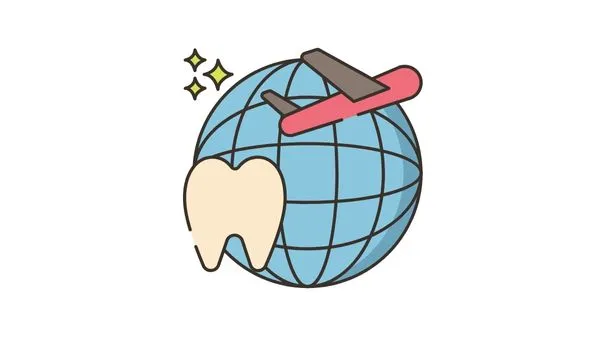Life as an Internationally Trained Dentist
Overcoming the challenges facing internationally trained dentists can be difficult and unique, from licensing examinations to cultural transitions. While pursuing dentistry in a different country is wonderful news and is a learning journey filled with personal and professional development opportunities, for many, being able to practice dentistry in North America, Europe, the Middle East, or elsewhere requires preparation and resilience, and a clear understanding of how to work as a dentist abroad.
In this blog, you will learn about the realities of being an internationally educated dentist: career paths, licensing requirements, cultural adaptation, and practical recommendations for succeeding in global dentistry.
Understanding the Global Dental Landscape

Dentistry is a highly respected and valuable skill worldwide. However, the qualifications you obtain in one country may not be recognized or valid in another. International-trained dentists will need to work through strict regulations, might be held to different treatment standards, and have long licensing processes before being able to practice independently.
Nevertheless, the allure is inviting and appealing: the potential for a higher salary, better clinical exposure, and the excitement of embarking on international dentist careers make the pain worth it.
Common Challenges Faced by Internationally Trained Dentists
Adapting to a new healthcare system is never easy. Internationally trained dentists are typically burdened with key issues like:
1. Licensing Issues: Each country has its licensing body and set of licensing requirements. The exams required to prove competence and obtain a driver’s license are, more often than not, an extensive process (and can take years).
2. Cost: They tend to incur costs for relocation, costs associated with exams, training programs, and living abroad.
3. Cultural & Language Barriers: Developing relationships with patients and colleagues can be difficult due to cultural awareness and, sometimes, a new language.
4. Professional Acceptability: Dentists might not be faced with impartial treatment or be given the benefit of the doubt within a new market until they have expertise.
5. Waiting Periods: Some countries have limited test dates; some have competitive residencies and waiting lists that prevent dentists from moving forward with their careers.
Regardless of having to face these obstacles, thousands of dentists can create successful and satisfying global careers every year.
How to Work as a Dentist Abroad
If you are, in fact, wondering how to practice as a dentist abroad, the process can be as simple as:
1. Research the country where you want to practice: Look into the eligibility criteria, the language requirements, and any associated costs.
2. Credential verification: Submit your degree and transcripts to the dental authority in the destination country for assessment.
3. Licensing exams: if the destination country allows you to practice as a dentist, you will have to take written, clinical, or practical assessments, depending on the destination country.
4. Bridging or Residency Programs: Some countries will require extra training before granting you full licensure.
5. Work Authorization & Visa: Obtain applicable work permits for legal employment or residency.
6. Job Recruitment & Networking: After you are licensed, you will be able to apply for clinics, hospitals, or private practices, and networking can also lead to job opportunities that match your skillset.
It will take planning and perseverance to accomplish all of these steps, but once you have been successful with all these steps, you may have a potential source of stable employment and learn about leading practices in the expanding dental field.
Also Read: How to Become a Specialist in Dentistry
What is the Licensing Process for Foreign-Trained Dentists?
The licensure process for foreign-trained dentists varies around the world.
1. United States & Canada – Dentists typically take the National Board Dental Examinations (NBDE or INBDE), plus clinical exams. Some will go through advanced standing or bridging programs with accredited dental schools.
2. United Kingdom – Dentists must take the Overseas Registration Exam (ORE) or the Licentiate in Dental Surgery (LDS).
3. Australia & New Zealand – Dentists must take written and clinical exams with either the Australian Dental Council (ADC) or the New Zealand Dental Council.
4. Middle Eastern Countries – Countries such as the UAE or Saudi Arabia will have exams plus clinical interview components, but the overall licensure process is quicker in comparison with many Western countries.
Although licensed internationally-educated dental professionals must endure a stringent pathway to licensure and job placement, several countries do have mentoring programs, training workshops, and exam preparation courses available to support internationally-qualified dentists.
What Are The Career Opportunities For an International Dentist?
Even after working through all of the obstacles, there are exciting international career opportunities for dentists as mentioned above:
1. Private Practice: Many dentists eventually open their own clinic in a new country once they are properly licensed.
2. Hospitals & Public Health Clinics: Offer predictable, stable jobs with hours and predictability. Often, these settings expose dentists to patients with varied and broad needs.
3. Dental Research & Academic Settings: Universities around the world are interested in recruiting international professionals to teach and conduct research.
4. Corporate Dentistry: Employment with a dental product company, or in consulting or administrative roles are possibility.
5. NGOs & Global Health Endeavors: Lots of opportunities to find ways to improve healthcare access to patients that may not easily be served.
Each career path provides a way to match dentists’ careers with their personal values about professions, whether that be income, academics, or social change.
Tips for Internationally Educated Dentists
Overnight success doesn’t happen abroad. Here are some tips for internationally educated dentists.
- ●Start Early: If you’re in dental school, do a thorough investigation of the requirements for your target country.
- ●Invest in Language Skills: Being able to communicate effectively is imperative to developing trust and rapport with patients.
- ●Find a Mentor: Connect with dentists who were able to successfully transition abroad.
- ●Be Open to Change: Be open to temporary or assistant positions while you work towards licensure.
- ●Be Current with Technology: Be aware of how technology, like CAD/CAM, 3D printing, and digital dentistry, is evolving; being comfortable with technology increases your employability.
- ●Network, Network, Network: Attend dental conferences, local dental association workshops, and other professional association meetings.
- ●Self-Care: Change of venue and preparing for exams can be a source of stress—know yourself better than anyone to find balance and long-term success.
Final Outcome on A Life of an International Trained Dentist
Life as an internationally trained dentist is a journey that leads you through challenges and opportunities. You will navigate licensing for foreign-trained dentists and cultural differences that evoke feelings of uncertainty along the way, while requiring your adaptation. However, in consideration of the financial rewards, professional development, and contributions to the oral health of the world in general, it can make it a fulfilling career option.
Ready to leap? Explore international dentist career opportunities, research your licensing pathway, and start building connections today. Working with a trusted dental recruitment agency can make all the difference. With the right strategy and resilience, you can thrive abroad and shape a successful future in global dentistry. Contact Hire Smiles to get started.
FAQs On Internationally Trained Dentist
1. What are the major challenges for internationally trained dentists?
The biggest challenges we hear from dentists from abroad are licensing exams, cultural adjustments, finances, and professional acceptance.
2. How do I work as a dentist abroad after I graduate?
Find out what the requirements are, confirm your dental credentials and licenses, pass the dental licensing exams, and apply to legally work abroad.
3. What international dentist careers can I pursue?
Private practice, hospitals, research, teaching, corporate dentistry, and non-governmental organizations.
4. What is the licensing process for foreign-trained dentists in the US?
Complete credential verification, written exams (INBDE), clinical assessments, and then complete an advanced standing program, if needed.
5. Are there any tips for internationally educated dentists starting to work abroad?
Yes. Begin your preparations early, work on your language skills, develop a network, and keep yourself current on advances in dental technologies.
6. Is public health a good path to take for foreign dentists?
Yes, because they offer stable employment and the opportunity to contribute to their communities, even if the salary is lower than in private practice.
7. Can a dentist who qualified in another country own a practice abroad?
Yes, after becoming a fully licensed dentist, many countries allow foreign-trained dentists to open a private practice.
8. Is it even worth the hassle to work as an internationally trained dentist?
Yes! The effort you put in as a foreign-trained dentist is well worth it, and once you are settled in your career, you will see the long-term benefits of a stable income, potential for professional income and career advancement, and the possibility of traveling to all parts of the world.
Related Article: How to Become a Dentist in the U.S.: A Comprehensive Guide for International Dentists





